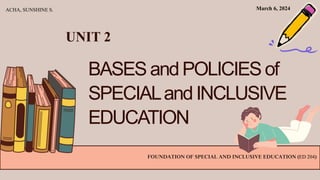
Jean Lave's Situated Learning final demo (1).pptx
- 1. BASES andPOLICIES of SPECIALandINCLUSIVE EDUCATION FOUNDATION OF SPECIAL AND INCLUSIVE EDUCATION (ED 204) ACHA, SUNSHINE S. UNIT 2 March 6, 2024
- 2. A. REVIEW OF THE BASES 1.Psychological Bases d. Jean Lave’s Situated Learning
- 3. Lesson Objectives Define Jean Lave’s Situated Learning Apply the significance of situated learning through a poem; Appreciate the importance of Situated Learning in the Development of practical skills and knowledge. K S A At the end of the lesson, the students will be able to:
- 4. Motivational Activity (10 minutes) Instructions: In the sticky notes provided ,each of the student will write down one memorable learning experience . Some of the you will be invited in front to share your reflections with the class and describe why the experience was meaningful to you and how it contributed to your learning and personal growth.
- 5. Jean Lave is Professor Emerita in the Department of Geography. She is a social anthropologist with a strong interest in social theory. Much of her ethnographically based research concentrates on the re-conceiving of learning, learners, and everyday life in terms of social practice. She is well- known as the co-author, with Etienne Wenger, of Situated Learning: Legitimate Peripheral Participation. In 1991 education theorists Lave and Wegner developed situated learning theory (SLT). The theory argues that knowledge should be learned in the same place as it is used.
- 6. Situated Learning posits that knowledge is not abstract and decontextualized, but rather situated within authentic activities and environments. It emphasizes the importance of social interaction, participation in communities of practice, and the use of authentic tasks to facilitate learning. JEAN LAVE’S SITUATED LEARNING
- 7. Learners engage in real-world activities, where they can observe, imitate, and collaborate with others, leading to the development of skills and understanding within a meaningful context. This approach highlights the interconnectedness of learning, identity, and practice, suggesting that learners become active participants in their learning through engagement in situated contexts. JEAN LAVE’S SITUATED LEARNING
- 8. 1. Learning in Context • Situated Learning suggests that knowledge is not abstract or detached from its context. Instead, it argues that learning is most effective when it occurs within authentic settings or real-world contexts. 2. Social Interaction: • The theory emphasizes the importance of social interaction in the learning process. Learners engage with others, such as peers, mentors, or experts, within a community of practice.
- 9. 3. Participation in Communities of Practice: • Situated Learning suggests that learning often occurs as individuals participate in communities of practice, which are groups of people who share a common interest or profession and collaborate regularly. Within these communities, individuals engage in authentic activities, solve real problems, and develop expertise through active participation.
- 10. 4. Authentic Task: • Learning is facilitated through the use of authentic tasks or activities that reflect real-world challenges or situations. These tasks are meaningful to the learner and provide opportunities for them to apply their knowledge and skills in practical contexts. By engaging in authentic tasks, learners can see the relevance of what they are learning and develop a deeper understanding of the subject matter.
- 11. Group 1 Pajaron Vanessa Venus Lunilyn Perater Sabello Chaila Jane Macaroy Generosa Toraja Alama, Lovely MaeBalbuena, Christian Manalo, RheymaMay Macatunog, Bernadith Group 2 Chiu, Willmarie Shaira Saga Michelle Rapada Rose River K. Arbolado Kent Nathaniel Omboy Berongan, Mary Grace Nebres, Jamaica Sabanal, Jessa Group 3 Sairose P. Malicse Discartin Kerk Edria Jerline Aseñas Katrina Capistrano Baman Kean Guillarawan Kinol Rufa Mae Regino Villasco, Mariel
- 12. Instruction: The class will be divided into 3 groups. The group 1 will be given a question to answer in an essay form, the Group 2 will compose a poem focusing on the importance of Situated Learning in the Development of practical skills and knowledge, and the Group 3 will do a role-playing showing a real scenario in a classroom where the teacher uses the Situated Learning. You will be given 10 minutes to do your assigned activity and 5 minutes to perform. Application (15 minutes)
- 13. TRUE or FALSE Direction: Write TRUE if the statement is correct and FALSE if it’s wrong. Defend your answer. 1.Situated Learning suggests that learning is enhanced when it occurs within meaningful and authentic contexts. 2.According to Situated Learning theory, knowledge is best acquired through abstract, disconnected activities. 3.Situated Learning emphasizes the importance of social interaction and collaboration in the learning process. 4.Situated Learning theory posits that learning is most effective when it is isolated from real-world experiences. 5.Situated Learning argues that transferring knowledge from one context to another is a seamless process for learners. Evaluation/ Assessment
- 14. Assignment Instructions: 1.Keep a journal for one week, documenting everyday activities and experiences that involve learning in some way. These activities can be as simple as cooking a meal, playing a sport, navigating public transportation, or engaging in a hobby. 2.For each documented activity, reflect on the following questions: • What was the context or situation in which the learning took place? • What specific knowledge or skills did you acquire or apply during the activity? • How did your interactions with others (e.g., family members, friends, strangers) influence your learning experience? • Did you encounter any challenges or unexpected outcomes during the activity? How did you navigate them? • How does the experience relate to the principles of situated learning theory, as discussed in class or in course materials?
- 15. Assignment Instructions: 3. At the end of the week, review your journal entries and identify common themes or patterns in you learning experiences. 4. Write a reflective essay summarizing your findings. Discuss how everyday activities can be viewed as opportunities for learning, and analyze how situated learning theory applies to your own experiences. Provide specific examples from your journal entries to support your analysis.